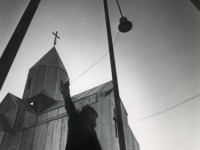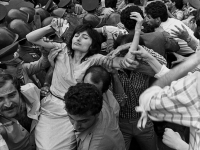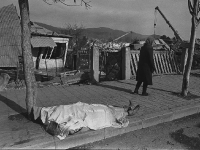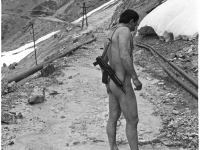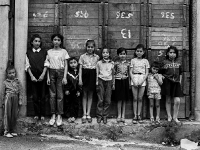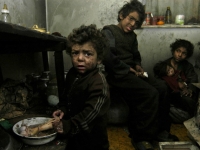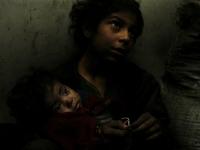Mangasaryan was born into the family of painter Sargis Mangasaryan. His father was also an amateur photographer and Ruben received his first camera as a present when he was seven. After abandoning early experiments with painting, Mangasaryan decided to devote himself to photography. He was quickly employed by various news agencies, first in Yerevan in 1985 for ‘Novosti Foto’ and then in Moscow. His work came to prominence only a few years later with the series made in response to the 1988 earthquake in Armenia’s north, which claimed more than 25 000 lives. Mangasaryan also chronicled the numerous marches calling for Armenia’s independence from USSR and its re-unification with the autonomous republic of Nagorno Karabagh, then part of Azerbaijan.
The subsequent focus of his work for over six years was the war with Azerbaijan over Karabagh’s independence. While actively present on the frontlines, Mangasaryan created his best known series, such as Military boxes 1992 about the lives of civilians who were caught in the conflict.
By early 1990s his photographs were appearing on the pages and screens of international media such as the BBC. In 1992 Mangasaryan was able to hold his first personal exhibition, ‘Road to independence’ in Tokyo which chronicled the struggles facing Armenia as it once again became a sovereign country.
Mangasaryan continued to focus on humanitarian issues throughout his career. His subjects included war veterans, the ethnic minorities in Armenia, refugees and the impoverished. In 1996 he founded the ‘Patker’ photo agency in Yerevan, which supplied images to Western media outlets thus ensuring a local voice could be seen and heard overseas. As an educator his role is unsurpassed in the history of recent Armenian photography. Many prominent young names working today, such as Anahit Hayrapetian and Anush Babadjanian attended the courses Mangasaryan held between 2005-06 together with German Avagyan or were strongly influenced by his work. In 2006 Mangasaryan co-organised (again with the participation of German Avagyan) a culturally and politically important project called ‘Merhabarev’ – a joint collaboration between Armenian and Turkish photographers that aimed to promote a bridge of understanding between these two divided nations. This tireless activity was tragically cut short when Mangasaryan died of a heart-attack aged 49.
His oeuvre is marked by a deep understanding of the history of photography and art in general. It transcends the limitations of photojournalism to create powerful humanist images that resonate beyond their immediate context, attaining a universal relevance that remains current to this day.
BIBLIOGRAPHY
Vigen Galstyan, Ruben Mangasaryan, essay in booklet for the exhibition ‘Road to independence’, NPAK, Yerevan, 2011, np.





